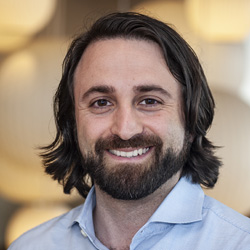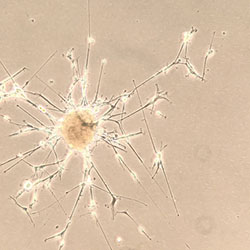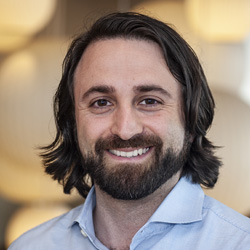Nicholas A Vitanza, MD

Specialties
- Children's Title: Attending Physician, Cancer and Blood Disorders Center
- Academic Title: Associate Professor, Hematology/Oncology
- Research Title: CNS CAR T Cell Lead, DIPG Research Lead
- Research Center: Ben Towne Center for Childhood Cancer Research
- On Staff Since: August 2016
"My goal is to find safer and more effective therapies for children with central nervous system (CNS) tumors (meaning, tumors of the brain and spine). As a pediatric neuro-oncologist, the director of the Vitanza Lab at the Ben Towne Center for Childhood Cancer Research, and our CNS CAR T cell lead, I am fortunate to work at the intersection where laboratory science translates to new clinical trials. Our work has helped advance epigenetically targeted drugs and targeted immunotherapies - such as CAR T cells - to the clinic for patients with fatal tumors such as diffuse intrinsic pontine glioma (DIPG), diffuse midline glioma (DMG), and atypical teratoid rhabdoid tumor (ATRT). Overseeing our multiple open CNS CAR T cell trials has allowed me to connect with in need families from all over the world and our pledge is to provide expert, compassionate care to each child we meet."
-
Biography
Dr. Nicholas Vitanza is a pediatric neuro-oncologist and translational scientist whose career is dedicated to the care of children with high-grade CNS tumors, particularly diffuse intrinsic pontine glioma (DIPG), diffuse midline glioma H3K27M-altered (DMG), and atypical teratoid rhabdoid tumor (ATRT). During his pediatric oncology fellowship with Drs. Bill Carroll and Elizabeth Raetz at New York University, laboratory projects led to a COG clinical trial and an ASPHO award. He completed a second fellowship in pediatric neuro-oncology at Stanford University and a post-doc in Michelle Monje’s neuroscience/DIPG Lab, in which he performed high-throughput drug screens in patient-derived DIPG models and mechanistic analyses of epigenetic vulnerabilities in DIPG. This work led to publications in Cancer Cell and Science Translational Medicine, as well as a phase 1 clinical trial.
In 2016, Dr. Vitanza joined the faculty at Seattle Children’s Hospital. His work and the work of the Vitanza Lab has focused on creating treatment-naïve biopsy-derived patient-derived DIPG/DMG models, discovering targetable molecular and immunologic vulnerabilities in these tumors, and translating these findings into innovative new clinical trials. Dr. Vitanza serves as Seattle Children’s DIPG Research Lead, overseeing a dedicated research program spanning laboratory work to patient care, and CNS CAR T Cell Lead, overseeing CAR T cell clinical trials for brain and spinal cord tumor patients. He has served as the Study Chair of multiple trials delivering repeated, locoregional chimeric antigen receptor (CAR) T cells, including BrainChild-01 (targeting HER2), BrainChild-02 (targeted EGFR), BrainChild-03 (targeting B7-H3), and BrainChild-04 (multi-antigen targeting of HER, EGFR, B7-H3, and IL-13ra2). BrainChild-03 and BrainChild-04 continue to actively enroll patients. His work has been shared at international conferences such as the International Society of Pediatric Neuro-Oncology and published in journals such as Neuro-Oncology, Nature Medicine, and Cancer Discovery. He was also an invited researcher to the Cancer Moonshot Brain Tumor Forum at the White House in 2023.
His goal is to better understand vulnerabilities in DIPG, DMG, and ATRT; translate those scientific discoveries into improved outcomes for affected children; and ultimately cure the remaining incurable CNS tumors of childhood.
Board Certification(s)
Pediatrics
Pediatric Hematology-Oncology
Education
American University of the Caribbean School of Medicine, Cupecoy
New York University, New York, New YorkResidency
State University of New York at Stony Brook, Stony Brook, NY
Fellowship
Lucile Salter Packard Children's Hospital-Stanford, Palo Alto, CA
New York University Langone Medical Center, New York, NY
NYU Langone Hospital, New York, NY
Stanford University School of Medicine, Stanford, CAClinical Interests
Brain and spinal cord tumors of childhood; diffuse intrinsic pontine glioma (DIPG); diffuse midline glioma (DMG); CAR T cell immunotherapy; early phase clinical trials
Research Description
My laboratory research focuses on developing new, targeted drugs and CAR T cell therapies against pediatric brain and spinal cord tumors, particularly diffuse intrinsic pontine glioma (DIPG), diffuse midline glioma (DMG), and atypical teratoid rhabdoid tumor (ATRT).
Research Focus Area
Cancer biology, Early phase clinical trials for pediatric brain tumors
-
Related Resources
-
Diffuse Intrinsic Pontine Glioma Research Program
Diffuse intrinsic pontine glioma (DIPG) and diffuse midline gliomas (DMG) are aggressive childhood cancers. The DIPG Research Program at Seattle Children’s focuses on development of new therapies for aggressive brain and central nervous system tumors through optimization of clinical care.
-
The goal of the Vitanza Lab is to find new treatments that are both safe and curative for high-grade, aggressive pediatric brain and spinal cord tumors.
-
-
Patient Testimonials
-
Awards and Honors
Loading...Award Name Award Description Awarded By Award Date {{ award.name }} {{ award.description }} {{ award.organization }} {{ award.displayDate }} No Awards and Honors found for Nicholas A Vitanza, MD
-
Publications
Loading...No Publications found for Nicholas A Vitanza, MD
-
Presentations
Loading...Presentation Title Event Location Date {{ presentation.title }} {{ presentation.presentedAt }} {{ presentation.location }} {{ presentation.displayDate }} No Presentations found for Nicholas A Vitanza, MD
-
Research Funding
Loading...Grant Title Grantor Amount Award Date {{ funding.title }} {{ funding.grantedBy }} {{ funding.amount }} {{ funding.displayDate }} No Research Funding found for Nicholas A Vitanza, MD
-
Clinical Trials and Research
Loading...{{ item.st }}
No clinical trials found for Nicholas A Vitanza, MD.

